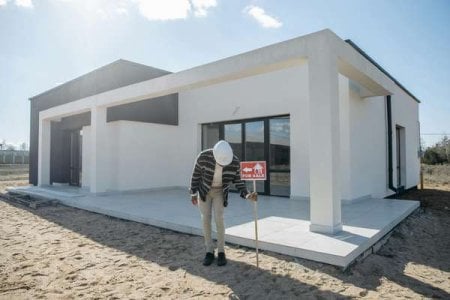Retirees in Gated Villages Expose Shocking Financial Nightmares - The Land Lease Scandal You Need to Know About!
By
Danielle F.
- Replies 14
As we age, the allure of a simpler, more community-focused lifestyle often leads us to consider options like gated villages, which promise comfort, security, and a sense of belonging. However, a dark cloud has been cast over this idyllic vision for many Australian retirees, who have found themselves entangled in the complexities and financial burdens of the land lease industry.
The land lease model, which has seen a boom in recent years, particularly in Victoria, offers a seemingly affordable housing option for seniors. Residents typically purchase the home itself but rent the land on which it sits, paying weekly site rental fees that can reach up to $250 for a couple. This model is particularly attractive due to the lower upfront costs and the eligibility for Commonwealth government rent assistance, given that most residents are pensioners.
But beneath the surface of this growing $12 billion industry lies a web of financial horror stories that have left many retirees feeling trapped and exploited. The crux of the issue lies in the hefty exit fees charged by companies like Lifestyle Communities when residents decide to sell their homes. These fees can start at 4% and scale up to a staggering 20% after five years, potentially taking up to $100,000 from a $500,000 sale.
Trish Reece and her husband Wayne, residents of a gated village in Shepparton, Victoria, have become the faces of this distressing situation. After nearly a decade, they wish to leave but find themselves financially handcuffed by the prospect of these exorbitant exit fees. Trish's poignant words, 'We're just vegetables waiting to pop off the perch so they can collect their exit fee,' echo the sentiments of many who feel like mere pawns in a profit-driven game.
The Reeces' story is not an isolated incident. ABC Investigations and 7.30 have uncovered widespread discontent among Lifestyle residents, with 80 from the Wollert community in Melbourne's northern fringe lodging claims in the Victorian Civil and Administrative Tribunal (VCAT). Accusations of fee gouging, charging rent to deceased residents, and unfair practices have surfaced, prompting the Victorian government to announce plans for reform, including a standardised site agreement for land lease residents.
The financial implications of these practices are profound, not only affecting the residents' current living situations but also casting a long shadow over their retirement savings. For some, like Deborah Jones, who has been fighting for her mother's rights for five years, the battle has become a call to the government to step in and regulate the industry to prevent discrimination against Victorians.
The stories of bullying, intimidation, and misleading contracts are not limited to Victoria. Across Australia, from Queensland to Perth, residents are raising their voices against the imbalance of power in the land lease sector. Roger Marshall, president of the Queensland Manufactured Home Owners Association (QMHOA), highlights the potential of the sector as a retirement living option but laments the weak regulation that has allowed questionable business practices to flourish.
The impact of these issues is not just financial; it's emotional and psychological. Residents like Judy Duff, who set up the Victorian Manufactured Home Owners Association to lobby for change, describe the situation as a 'legislative black hole' where once you're in, you can't afford to get out. The emotional toll is evident in the stories of residents who feel misled, trapped, and unable to enjoy the retirement they had envisioned.
The Victorian government's response, a research project led by the commissioner for residential tenancies, is a step in the right direction. However, for many residents, the need for action is urgent. They are calling for legislation reform, standard leases, voided exit fees, dispute resolution, and management training to address what some describe as elderly abuse.
As we consider our retirement living options, it's crucial to be aware of the potential pitfalls of the land lease model. The stories of retirees like Trish Reece serve as a cautionary tale and a rallying cry for change. It's a reminder to do our homework, understand the contracts we sign, and advocate for a fair and just system that protects our seniors rather than exploiting them.

The land lease scandal is a complex issue that requires a multifaceted approach, including government intervention, industry regulation, and increased awareness among potential residents. As a community, we must support our seniors and ensure that their golden years are not tarnished by financial nightmares but are instead filled with the peace and security they so rightly deserve.
The land lease model, which has seen a boom in recent years, particularly in Victoria, offers a seemingly affordable housing option for seniors. Residents typically purchase the home itself but rent the land on which it sits, paying weekly site rental fees that can reach up to $250 for a couple. This model is particularly attractive due to the lower upfront costs and the eligibility for Commonwealth government rent assistance, given that most residents are pensioners.
But beneath the surface of this growing $12 billion industry lies a web of financial horror stories that have left many retirees feeling trapped and exploited. The crux of the issue lies in the hefty exit fees charged by companies like Lifestyle Communities when residents decide to sell their homes. These fees can start at 4% and scale up to a staggering 20% after five years, potentially taking up to $100,000 from a $500,000 sale.
Trish Reece and her husband Wayne, residents of a gated village in Shepparton, Victoria, have become the faces of this distressing situation. After nearly a decade, they wish to leave but find themselves financially handcuffed by the prospect of these exorbitant exit fees. Trish's poignant words, 'We're just vegetables waiting to pop off the perch so they can collect their exit fee,' echo the sentiments of many who feel like mere pawns in a profit-driven game.
The Reeces' story is not an isolated incident. ABC Investigations and 7.30 have uncovered widespread discontent among Lifestyle residents, with 80 from the Wollert community in Melbourne's northern fringe lodging claims in the Victorian Civil and Administrative Tribunal (VCAT). Accusations of fee gouging, charging rent to deceased residents, and unfair practices have surfaced, prompting the Victorian government to announce plans for reform, including a standardised site agreement for land lease residents.
The financial implications of these practices are profound, not only affecting the residents' current living situations but also casting a long shadow over their retirement savings. For some, like Deborah Jones, who has been fighting for her mother's rights for five years, the battle has become a call to the government to step in and regulate the industry to prevent discrimination against Victorians.
The stories of bullying, intimidation, and misleading contracts are not limited to Victoria. Across Australia, from Queensland to Perth, residents are raising their voices against the imbalance of power in the land lease sector. Roger Marshall, president of the Queensland Manufactured Home Owners Association (QMHOA), highlights the potential of the sector as a retirement living option but laments the weak regulation that has allowed questionable business practices to flourish.
The impact of these issues is not just financial; it's emotional and psychological. Residents like Judy Duff, who set up the Victorian Manufactured Home Owners Association to lobby for change, describe the situation as a 'legislative black hole' where once you're in, you can't afford to get out. The emotional toll is evident in the stories of residents who feel misled, trapped, and unable to enjoy the retirement they had envisioned.
The Victorian government's response, a research project led by the commissioner for residential tenancies, is a step in the right direction. However, for many residents, the need for action is urgent. They are calling for legislation reform, standard leases, voided exit fees, dispute resolution, and management training to address what some describe as elderly abuse.
As we consider our retirement living options, it's crucial to be aware of the potential pitfalls of the land lease model. The stories of retirees like Trish Reece serve as a cautionary tale and a rallying cry for change. It's a reminder to do our homework, understand the contracts we sign, and advocate for a fair and just system that protects our seniors rather than exploiting them.
Key Takeaways
- Pensioners Trish Reece and her husband Wayne feel financially trapped in a gated village due to high exit fees charged by Lifestyle Communities upon selling their home.
- Residents in Lifestyle Communities and similar land lease communities across Australia have raised concerns about fee gouging, implying that the industry takes advantage of residents.
- The Victorian government has announced plans for reforms, including a standardised site agreement to protect land lease residents' interests.
- Discontent among some residents has put a spotlight on the land lease sector, highlighting a need for better regulation and protections against unfair practices in the industry.








